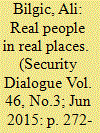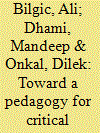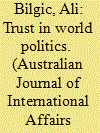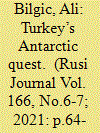|
|
|
Sort Order |
|
|
|
Items / Page
|
|
|
|
|
|
|
| Srl | Item |
| 1 |
ID:
139415


|
|
|
|
|
| Summary/Abstract |
The objective of emancipatory security theory is to examine the insecurities of individuals and social groups that stem from oppressive power processes, relations, and structures. However, the image of power in emancipatory security studies does not correspond to such a normative and analytical motivation. This renders the theory susceptible to substantial criticism on the grounds of inadequate analysis of resisting individuals as agents of security in their own localities. To address this issue, the present article conceptualizes ‘emancipatory power’. In this exercise, Hannah Arendt’s understanding of power, enriched by Judith Butler’s concept of performativity and feminist insights, will be used as the theoretical foundation to tailor collective power based on trust in a ‘moment’ of emancipation. Collective power will be illustrated by references to the protests in Cairo’s Tahrir Square in 2011.
|
|
|
|
|
|
|
|
|
|
|
|
|
|
|
|
| 2 |
ID:
160971


|
|
|
|
|
| Summary/Abstract |
International relations has increasingly paid attention to critical pedagogy. Feminist, postcolonial, and poststructuralist international relations scholarship, in particular, have long been advancing discussions about how to create a pluralist and democratic classroom where “the others” of politics can be heard by the students, who then can critically reflect upon complex power relations in global politics. Despite its normative position, critical security studies has so far refrained from joining this pedagogical conversation. International relations scholars in critical security studies can contribute to the production of a critical political subject in the “uncomfortable classroom,” one who reflects on violent practices of security. Three pedagogical methods will be discussed here: engaging with the students’ lifeworlds, revealing the positionality of security knowledge claims, and opening up the classroom to the choices about how student agency can be performed beyond the classroom. The argument is illustrated with reference to international relations and politics students’ perceptions of Syrian refugees in Turkey. The article advances the discussion in critical international relations pedagogy and encourages critical security studies scholarship to focus on teaching in accordance with its normative position.
|
|
|
|
|
|
|
|
|
|
|
|
|
|
|
|
| 3 |
ID:
118959


|
|
|
|
|
| Publication |
2013.
|
| Summary/Abstract |
Scholars of the societal security dilemma implicitly or explicitly aim to analyse actor responsibility in intersocietal group confrontations. However, adherence of these approaches to (neo-)realist theoretical assumptions of the security dilemma hinders this objective. This article provides analytical principles upon which a new societal security dilemma can be constructed in order to conduct a more comprehensive analysis of actor responsibility. A new societal security dilemma framework can be built upon three principles: (1) a security dilemma results in violence depending on how the actors themselves interpret the political structure in which they interact with others; (2) differentiation of actors' intentions as malign or benign is inconsequential; what matters is how actors interpret security and which tools they choose to adopt to achieve security; and (3) identity is not exogenous to the politics of security. Adopting these principles requires reconceptualisation of the security dilemma. It will be argued that a new societal security, which reflects the politics of security, can provide a more comprehensive, dynamic, political, and realistic analysis of actor responsibility in societal-level confrontations. These new principles will be illustrated through re-reading of the dissolution of Yugoslavia to analyse actor responsibility as a sketch of the new societal security dilemma theorising.
|
|
|
|
|
|
|
|
|
|
|
|
|
|
|
|
| 4 |
ID:
127351


|
|
|
|
|
| Publication |
2014.
|
| Summary/Abstract |
In the discipline of international relations, the concept of trust has been theorised in two ways: the 'rationalist' approach and the 'normative' approach. This article aims to show that these approaches do not adequately reflect how trust operates in world politics and that trust provides a new way of understanding the identity-security nexus in international relations. It is argued that as actors learn to trust each other, this trust-learning process has a transformative effect on their definition of self-interests and identities. The elaborated understanding of trust in the security dilemma is operationalised in terms of the immigration security dilemma.
|
|
|
|
|
|
|
|
|
|
|
|
|
|
|
|
| 5 |
ID:
185915


|
|
|
|
|
| Summary/Abstract |
In the past five years, Turkey has become active in Antarctica, although these efforts have been overlooked in political and academic debates on Turkish foreign policy. In this article, Ali Bilgic explains the underlying reasons for Turkey’s accelerated efforts in Antarctica as part of its status-seeking foreign policy with a global geopolitical scope. He argues that, while Ankara clearly wants to build influence around the world, including Antarctica, it is unlikely that Turkey is seeking significant changes in the Antarctic geopolitical balance. Nevertheless, the patterns in Ankara’s behaviour suggest if the Antarctic Treaty System parties ignore or reject Turkey’s status-seeking in the region, then there might be a change in Turkish strategy.
|
|
|
|
|
|
|
|
|
|
|
|
|
|
|
|
| 6 |
ID:
140110


|
|
|
|
|
| Summary/Abstract |
Turkey’s policy-makers have historically aimed to position Turkey within the West by convincing the latter that Turkey meets the ‘standards’ of the West, that they ‘are not barbarians’. This article aims to offer a gender analysis of Turkey’s relations with the West by showing how ‘devalorization’ as feminization and hypermasculinization of the non-West becomes a source of insecurity for non-Western policy-makers. This gendered ontological insecurity is intensified when they face a military threat from a third party. The argument is that Turkey’s policy-makers try to benefit from military crises in order to represent Turkey as a state meeting Western ‘standards’ of masculinity, and therefore to address its gendered ‘devalorization’. The analysis aims to contribute to the literatures of postcolonial feminism and non-Western insecurities.
|
|
|
|
|
|
|
|
|
|
|
|
|
|
|
|
| 7 |
ID:
180836


|
|
|
|
|
| Summary/Abstract |
European states have adopted strict migration policies, such as unlimited detention in Britain, to address increasing anti-immigrant emotions in the context of rising anti-immigrant populism. These state practices prioritize the feelings of insecurity of some population groups towards immigrants whose emotions and insecurities are politically marginalized. Consequently, whose emotions matter in politics intertwines with whose security matters. This article articulates emotions in politics of security as an entitlement, which feed into the question of who ‘merits’ security politically. By focusing on individuals to whom such entitlement is denied in the context of anti-immigrant populism, it investigates how immigrant women ‘feel’ detention and enact their emotions in their own everyday ‘felt’ security. The research is conducted through in-depth interviews with women who experienced detention in Britain. Through the method of ‘listening guide’ adapted from psychology, the research studies their narratives about their emotions before, during and after detention. By bringing together the feminist research on emotions and ‘everyday security’ approaches in International Relations, this analysis contributes to feminist IR and security studies on women's agency in the politics of security, by revealing the importance of emotional dynamics in their everyday ‘felt’ security practices. Therefore, it offers a path for feminist IR and security studies to prioritize those whom anti-immigrant populism aims to silence in the age of populism.
|
|
|
|
|
|
|
|
|
|
|
|
|
|
|
|
|
|
|
|
|